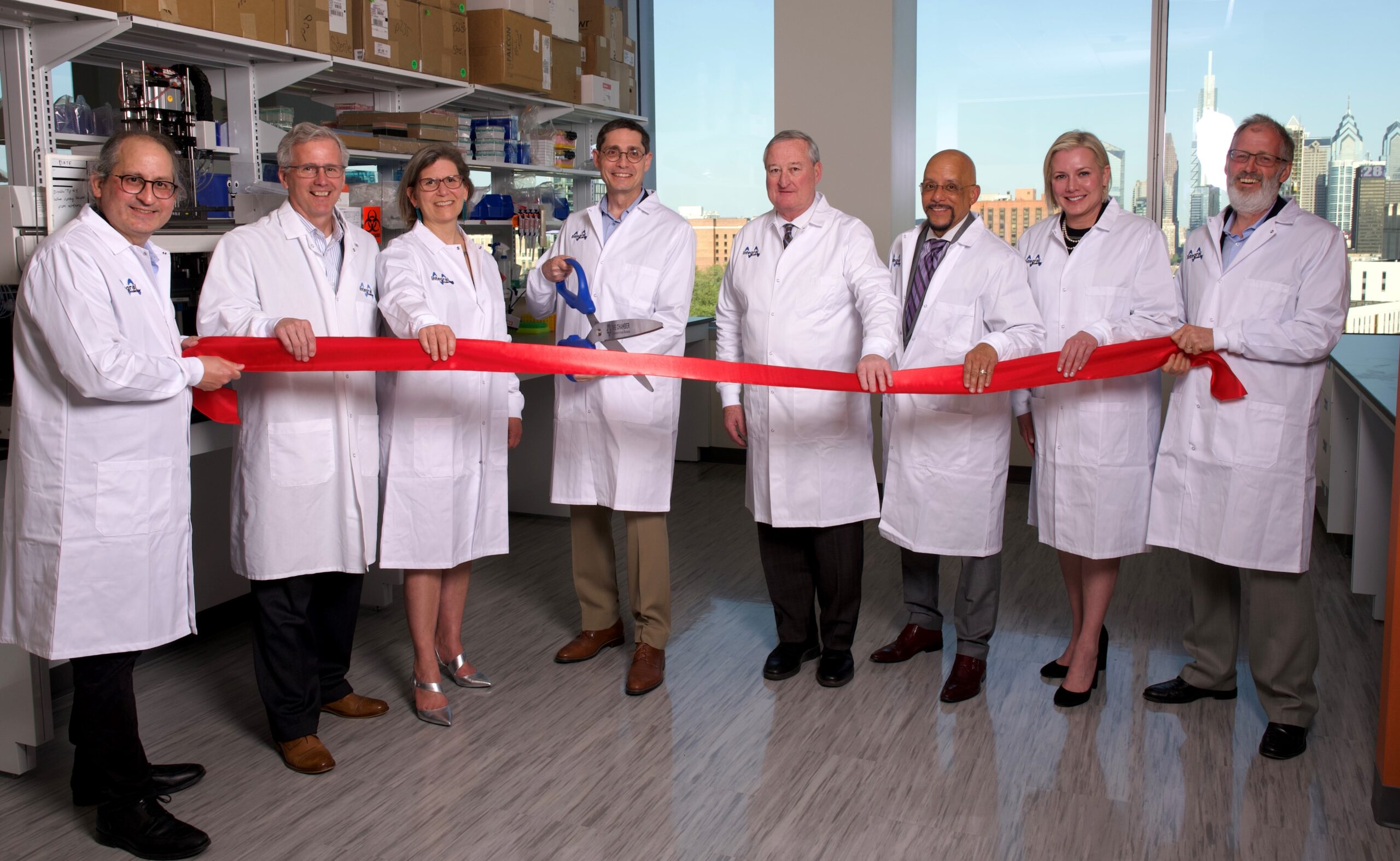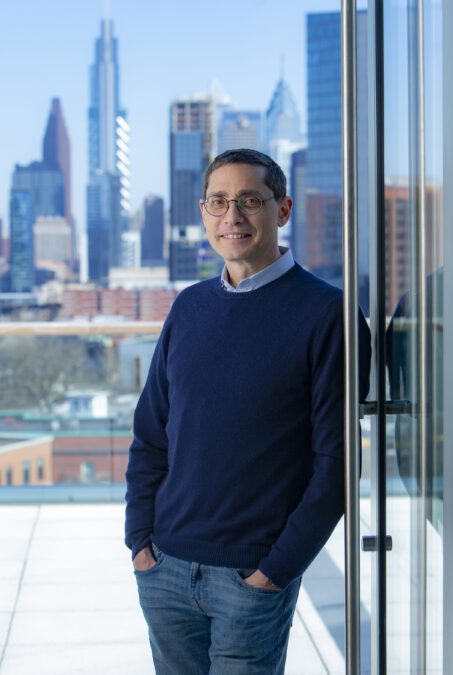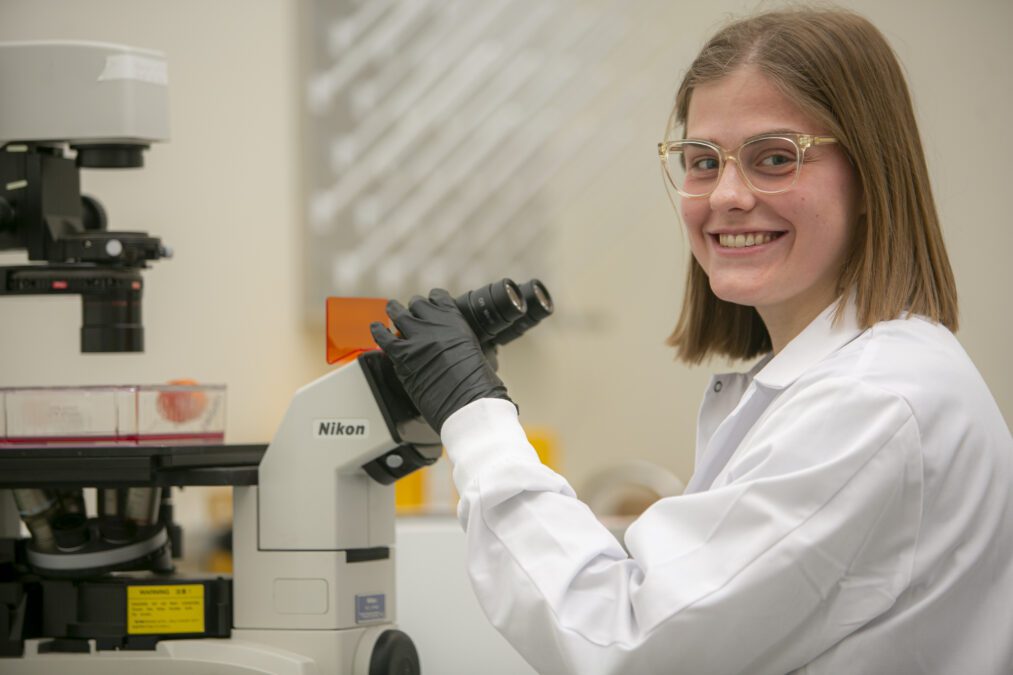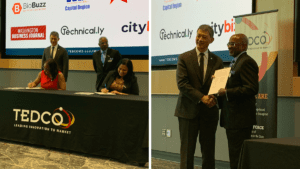
Integral Molecular Redefining Success in the Heart of Philadelphia
By Mark Terry
April 25, 2023
Integral Molecular has cut the ribbon in its new headquarters, the first tenant in Philadelphia’s One uCity. Integral Molecular will take over 32,000 square feet of the 13-story, 400,000-square-foot commercial research facility expected to open later this year.
In addition to serving as Integral’s new headquarters, the space will also be home to the company’s integrated research facilities and its pandemic preparedness laboratories.
Benjamin Doranz, Co-Founder, President and CEO of Integral Molecular, told BioBuzz they took residency in December. “It’s beautiful. We’re actually opening another 16,000 square feet next year. We’re the first occupants, although the building will be completely full by this time next year.”

Doranz also notes that they’re working out all the kinks, which includes getting the company’s address on the GPS and Google Maps so that everyone, including FedEx and UPS, can find them.
One of the first companies to launch Philly’s life science scene 20 years ago, Integral Molecular is a mix of a biotech company and a contract research organization (CRO).
“We’re kind of an unusual company in that we do sell products and services. Our products are virus particles, membrane proteins, and lipoparticles. We have services like our Membrane Proteome Array and our Shotgun Mutagenesis Epitope Mapping. Those fall more into the CRO category, although all with a very proprietary technology focus,” Doranz said.
The other part of the company, he goes on to say, is “more partnership-based and therapeutic discovery-based, working with partners like Context Therapeutics and AstraZeneca on developing the next generation of therapeutics, especially against very difficult targets — basically discovering antibodies and developing antibodies that would never get discovered without our technologies.”
The company has five solutions: MPS Antibody Discovery, Lipoparticles, Epitope Mapping, Membrane Proteome Array, and Virology. Founded in 2002 by Doranz, Sharon Willis, VP of Sales and Customer Relations, and Joseph Rucker, VP of Research and Development, Doranz said the company “has become the industry leader in discovering antibodies against complex targets, including membrane proteins, conserved proteins, and other difficult targets. We have a number of branches to our business, all focused around membrane proteins, which include viral proteins. So we have a big focus on antibody discovery, antibody characterization, and providing tools against those types of targets to the vaccine and pharmaceutical industry.”
The three co-founders met when they were in graduate school or post-doctorate programs at the University of Pennsylvania.
“We saw complex technologies, complicated research projects, and a need in the market for tools and expertise that could solve those difficult problems. And no one else was doing that. So we used our expertise, our education, our technologies, and invented more technologies to solve those kinds of difficult challenges in the research industry,” Doranz said.
In discussing Philadelphia as a hotspot for life sciences, Doranz said that when they started the company in 2001, in the building next door to the new headquarters, there was nothing on the block.
“It was basically a giant parking lot. Literally, there was nothing here. And now there are half a dozen or more large buildings, most of which house other biotech companies, hospitals, doctors, clinics, incubators, restaurants, condominiums, and apartments. It’s become a thriving community and we’re proud that we’re one of the first there to get that started.”
Doranz points out that “you can start a company or operate a company in a cornfield in the middle of nowhere, and there’s nothing wrong with that. But the advantage of being where we are now is that we’re surrounded by an ecosystem of support. So when I walk down the block and grab lunch, I run into fellow entrepreneurs, I run into other scientists, I run into funders and venture capitalists, managers and accountants and finance people.”

This is similar to what other biotech leaders say about the major hotspots in Boston and San Francisco. It’s not a necessity, but it does make the industry easier. And that people working at these companies have the option of shifting jobs without necessarily uprooting families to other parts of the company or world.
“The advantage is I can bounce questions off them. We can establish partnerships and we can convey the frustrations of working, trying to figure out how to find the right law firm or the right accounting firm or the right insurance firm. It’s supporting each other,” Doranz said.
Integral Molecular currently has about 100 employees. The new space, along with the additional space they intend to add next year, will allow the firm to grow to about 200 staffers.
“We’re still in a growth phase,” Doranz said. “We’re actively hiring new employees. We have great employees, great scientists already, and we keep getting even better.”
The company is currently developing tools for vaccines, including COVID-19 vaccines, and working to get their partners’ new drugs to market.
“We’ve created the gold standard for biotherapeutic safety for the FDA. And we’re really excited about the new space, which is really just the start of our next phase of growth, of the company’s investment in the next decade of growth to create new tools, new drugs, and new services that meet the needs of the market,” Doranz said.
The ninth floor of the new facility will be the company’s Pandemic Preparedness Center, which expand its research into viruses and vaccines.
“We’ve been working with deadly viruses for the past 20 years,” Doranz noted. “We don’t actually work with live viruses, but our tools enable scientists worldwide to work with them in a safe way, to work with viruses like Ebola and SARS and Zika, but to do it in a BSL 2 environment because the genome of the virus is completely stripped out.”
Integral Molecular is also creating new protein engineering tools that are artificial intelligence (AI)-based, which will enable predictive models of protein engineering. In addition, the company can leverage its high-throughput molecular and cell biology platforms to generate hundreds and even thousands of mutants of various proteins for testing, for humanization, affinity maturation, and biological development.
The company also has active participation in training programs around the area, such as partnerships with The Wistar Institute, the West Philadelphia Skills Initiative (WPSI) and Drexel University. It also has an unusual program, a bio-art residency, where artists are brought through, spend three months in the company, and “create fabulous artwork that all ask the question of what does science mean? What does biotech accomplish? What are viruses and vaccines and drugs? What do they mean to society? What do they mean to us individually?” described Doranz “We have some amazing artwork on our walls that have been displayed nationally and internationally that comes out of that residency program.”
When talking about the Philadelphia area, which is so integral to the company, Doranz said, “If you look at the per-square-foot cost of rent, you can get lower in the middle of nowhere, but then you’re not surrounded by the resources, the people, the access to the universities, the environment, the support systems that are in place here to make you successful. It’s very hard to quantify success, and it’s not a per-square-foot number that defines success. What defines success is being surrounded by an environment that’s going to support you as you make difficult decisions, as you go through your company life cycle, hiring the right employees, connecting with the right resources, connecting with the right mentors. You need to be surrounded by the right ecosystem to succeed.”
- About the Author
- Latest Posts
Mark Terry is a freelance writer, editor, novelist and ghostwriter. He holds a degree in microbiology & public health and spent 18 years in infectious disease research and clinical and research genetics prior to his transition to a writing career. His areas of expertise include biotechnology, pharma, clinical diagnostics, and medical practice management. He has written literally thousands of articles, as well as market research reports, white papers, more than 20 books, and many other written materials. He currently lives in Michigan with his family.







